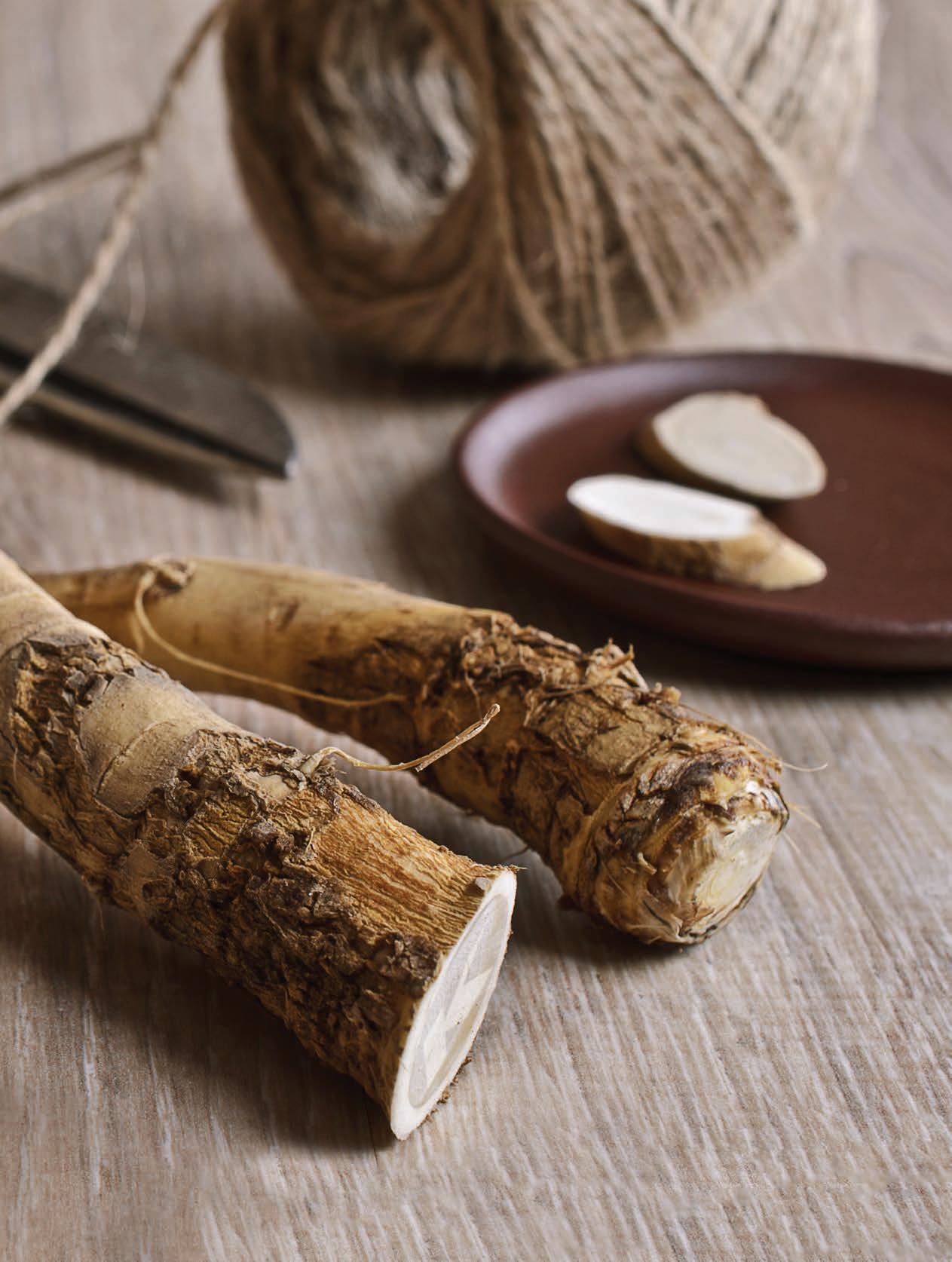
ה”ב
5775 ה”עשת חספ א
רשכ
חספ
CERTIFIED SOUL NUTRITION
PESACH
ןוא
ןכעליירפ
Wishing You a Happy Pesach!
By Rabbi Yitzchak Hanoka
KOSHER
By Leigh Hershkovich
By Rabbi Elisha Rubin
By Rabbi Levi Klein
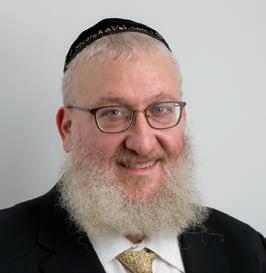
The Middle Matzah
Compiled by Dina Fraenkel
By Rabbi Chaim Fogelman
Dina Fraenkel
Dear Reader,

I recently returned from our Holy Land, Eretz Yisroel , where I visited the headquarters of ~ Israel. It was so nice to meet our counterparts, the rabbis and staff, face to face and see their wonderful operation firsthand. I must say, however, that I was a bit surprised by the general public’s intense focus on kashrus. You see, it’s only natural for people to become complacent in their everyday routine. In the Diaspora (Golus) unless your life’s work is in the kashrus field, most kosher consumers glance at the hechsher on the label for a second or two and move on. When eating out, if they see a kosher certificate hanging on the wall, they are happy.
But this year is shemitta in Eretz Yisroel. It was so delightful to see people actually reading kosher certificates and questioning the different establishments about their hechsher. I saw people everywhere paying close attention to the different kashrus details. It wasn’t enough that the sign said “Kosher L’mehadrin”. Was the date valid? Where were the vegetables from? Was the produce from last year (the sixth year)? (Yes, there are ways to preserve sixth year produce!) Was the produce from outside halachic Eretz Yisroel? Or from heter mechira (which many do not rely on)? I found it interesting that, in contrast to what most people believe, shemitta is not something only for the Israeli farmers; it turns out to be a “kosher wakeup call” for all of us.
It connected well for me as I was walking through the Old City of Yerushalayim. I was told that in the days of the Bais Hamikdash some of the stairways leading up to Har HaBayis were intentionally uneven, with some steps higher than the others. This forced the Yidden to focus on their steps. They needed to concentrate on the fact that they were now walking into the Har HaBayis. In a way, shemitta has the same effect; it forces us to focus our attention on what we are eating.
Now, Yidden all over the world are celebrating Pesach, the holiday of Geulah, of Yetzias Mitzrayim. We need to join our brethren in Eretz Yisroel and heighten our awareness of kashrus. There is no better time than now, at the Yom Tov of Pesach, and, coupled with shemitta, our antennae can be on an all-time high. May this intense focus on the mitzvah of kashrus, which feeds our physical bodies and our holy souls by giving us strength to do mitzvos, carry over and heighten our awareness and help us each experience the final Yetzias Mitzrayim out of Golus.
Wishing you all a kosher and freilichen Pesach,
Chaim Fogelman
Editor in Chief
SPIRIT Pesach 5775 EDITOR-IN-CHIEF:
Rabbi Chaim Fogelman EDITOR:
DESIGN:
We welcome your comments, submissions and letters to the editor.
391 Troy Avenue, Brooklyn, NY 11213 Email: editor@kosherspirit.com © 2015. No portion of this publication may be reprinted without written consent from the publisher.
the QR code with your smartphone to receive a PDF subscription to Kosher Spirit 3 4 5 6 8 12 14 16 19 20 22 23 SHARE YOUR SPIRIT
ART
CERTIFICATION
Spotlight Design
Mail:
Scan
QUESTIONS FOR THE ~ HEALTHY SPIRIT Tea vs. Coffee PESACH RECIPES Coconut Clusters & Meringue Cups THE
OF KOSHER
FROM THE DESK OF RABBI
YOEL LEVY
KOSHER IN… THAILAND
DON
KEEPING
KOSHER TRAVEL TIPS
HEALTHY
PRATIS
HASHGOCHA
WHO’S BEHIND THE ~ Rabbi Kalman Weinfeld CHASSIDIC INSIGHTS
SOUL NUTRITION
Share Your Spirit
Readers share their thoughts...

~ mashgichim do more than inspect and supervise food productions. Sometimes they have the zechus of helping Jews observe other mitzvos! Rabbi Yosef Dovid Chanowitz was inspecting the bakery at a major national store, where one of the employees is a traditional Bucharian woman whose kids are frum. She mentioned to Rabbi Chanowitz that she would very much like to leave earlier on Fridays so that she can get home in time for Shabbos. Rabbi Chanowitz spoke to her boss, the bakery manager, and explained the matter. The bakery manager was quite supportive, and he rearranged the employee’s hours so that she leaves early enough on Fridays to get home in time for Shabbos.
Dear Kosher Spirit,

I appreciated your profile of Rebbetzin Levy.

When her husband worked for the JEC in Elizabeth,NJ, I think Rabbi Levy (A’H) was Executive Director for a couple of years, she was my preschool teacher (they called it primer back then)!
Happy to hear that she remains well.
-Steve L.
Kosher Spirit responds: Mrs. Levy was moved to tears and she appreciates your note immensely.
FEEDBACK
www.KosherSpirit.com 3
The ~ Responds:
Any fully baked pie crust must be made Pas Yisroel during the actual manufacturing process. A common example of a fully baked pie crust is graham cracker crusts. For those who are makpid on Pas Yisroel, they should only buy a graham cracker or other fully baked crust that states “Pas Yisroel” on the label. Par baked (also known as under baked) crusts CAN be made Pas Yisroel at home when baked by a Shomer Shabbos person. A par baked crust is usually frozen and often says “par baked” or “bake at home” on the label. This type of pie crust needs a reliable kosher symbol, but does not have to be Pas Yisroel since it can still be made Pas Yisroel when baked by a Shomer Shabbos person.
A completely raw pie crust or pie dough can also be made Pas Yisroel at home when baked by a type of crust is generally frozen and includes instructions to bake fully at home. This type of pie crust
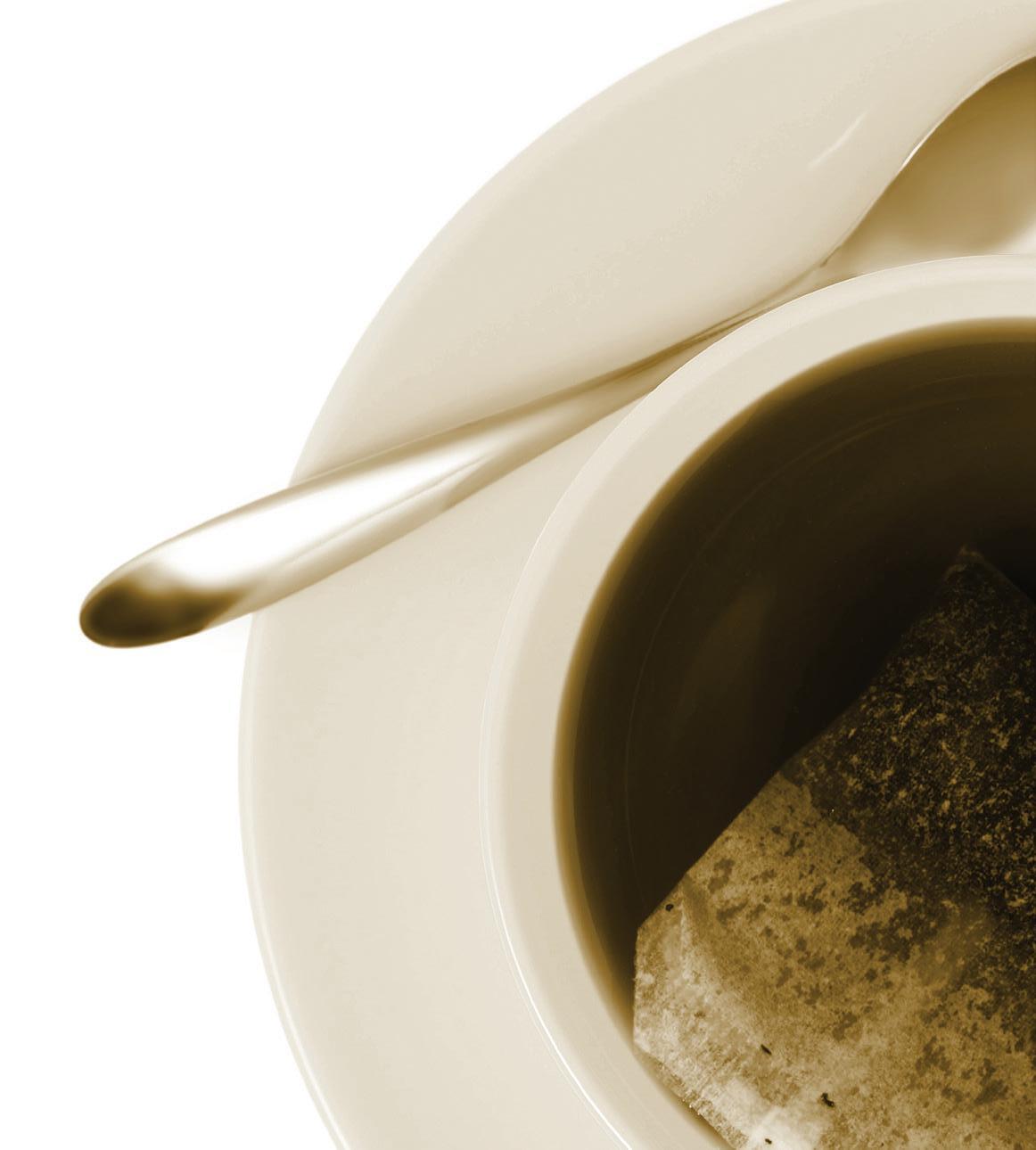


4 www.OK.org
The ~ receives many letters/emails with kosher questions...
What kinds of store bought pie crusts need to be Pas Yisroel? Are there any kinds of pie crusts that will become Pas Yisroel once I bake them at home?
STAYING UP ALL NIGHT ON SHEVI’I
SHEL PESACH… VS Tea Coffee
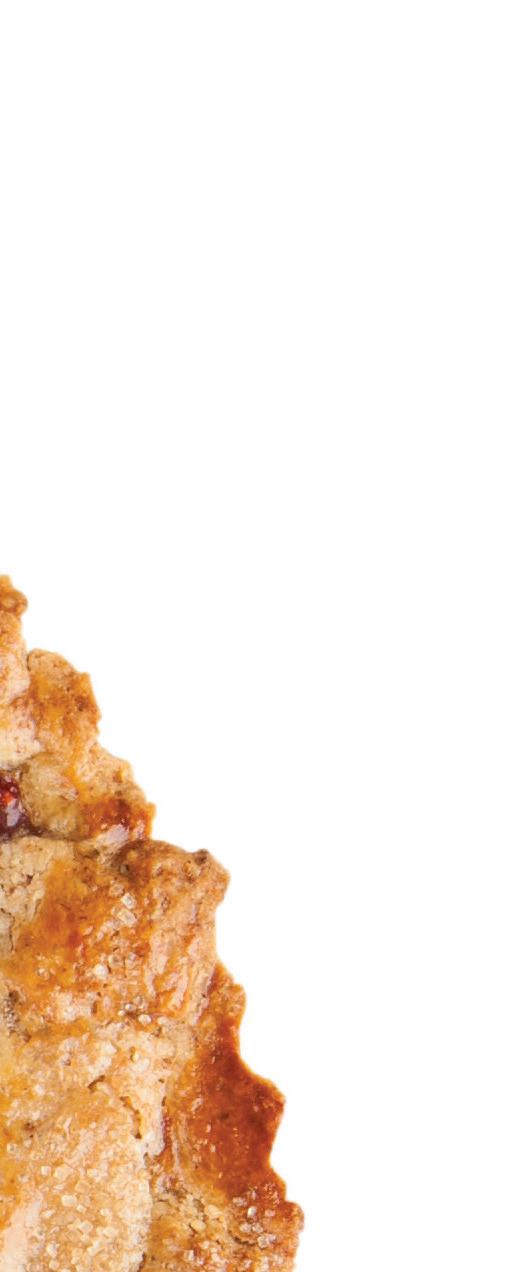
Antioxidants in white tea may slow the
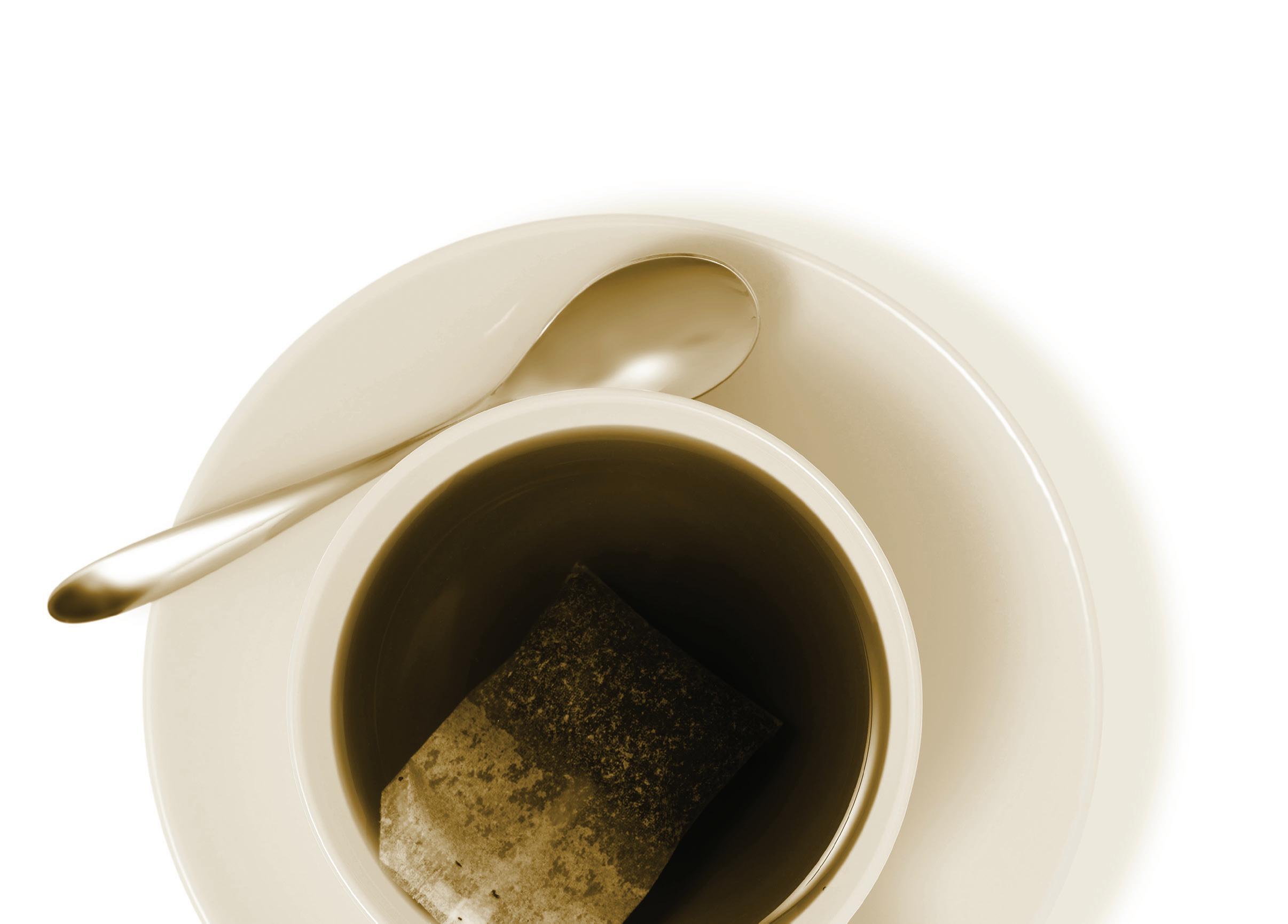
Coffee drinkers are less likely to suffer from Alzheimer’s disease
Drinking coffee helps prevent
increases the effectiveness of Coffee improves short term recall
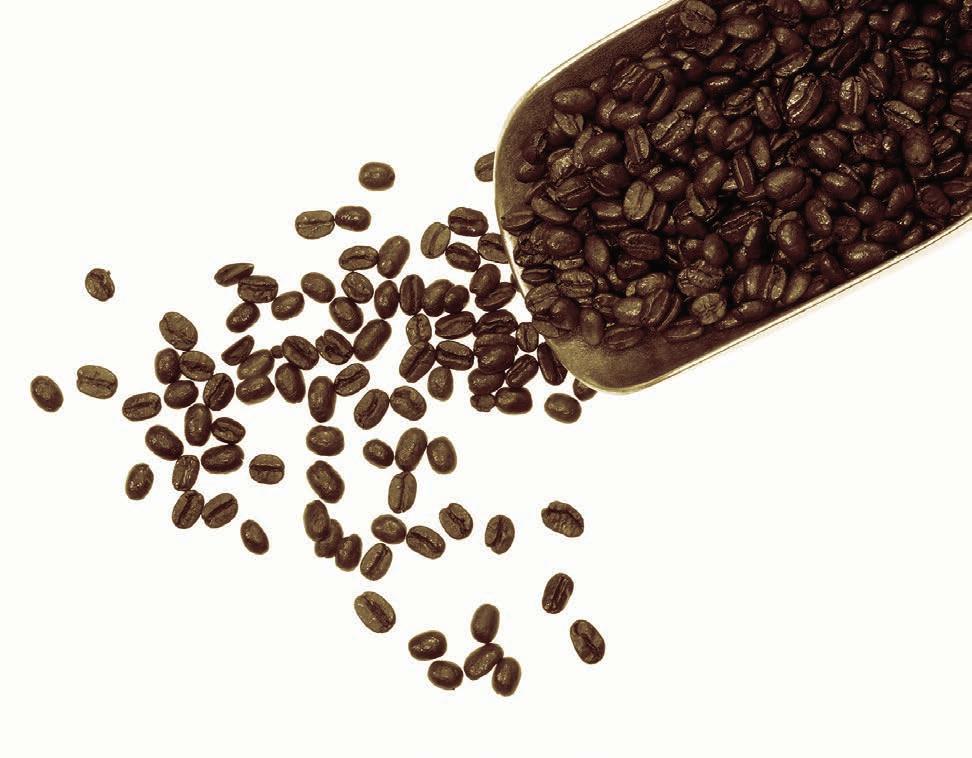
www.KosherSpirit.com 5
COCONUT CLUSTERS
With barely any baking required, these clusters are ready in no time.
INGREDIENTS
2½ cups shredded unsweetened coconut, lightly toasted
½ cup toasted almonds, cooled and chopped
7-ounces dark chocolate, chopped sea salt or kosher salt

DIRECTIONS
Combine the coconut and almonds in a large bowl. Melt chocolate in a double boiler. Pour the melted chocolate over the coconut mixture and stir to combine.
Let cool a few minutes and then form into walnut-sized balls and drop onto a baking sheet lined with parchment paper. Mixture will be quite moist resulting in clusters as opposed to round balls. Top each cluster with a gentle sprinkling of salt.
Allow clusters to cool and harden at room temperature, about 2 hours, or put them in fridge for about 20 minutes.
6 www.OK.org 6 www.OK.org 6 www.OK.org
RECIPE
MEYER LEMON AND GRAPEFRUIT MERINGUE CUPS
Sweet and tart, this dessert can be creatively served in hollowed lemon halves (be sure to save them after juicing!).
INGREDIENTS
For the Curd:
3 Meyer lemons, juice and zest only (optional)
1 grapefruit, juice only
DIRECTIONS
6-oz walnut, grapeseed or cottonseed oil
1½ cups sugar
5 eggs
2 egg yolks
Whisk all ingredients in a medium saucepan. Allow to cook for about 10 minutes on medium/low flame, stirring often. Meanwhile, place a fine sieve over a Tupperware. When curd thickens (it will not get super thick) remove from heat and pour curd through sieve. Allow curd to cool and then place in fridge to chill.
INGREDIENTS
Quickie meringue:
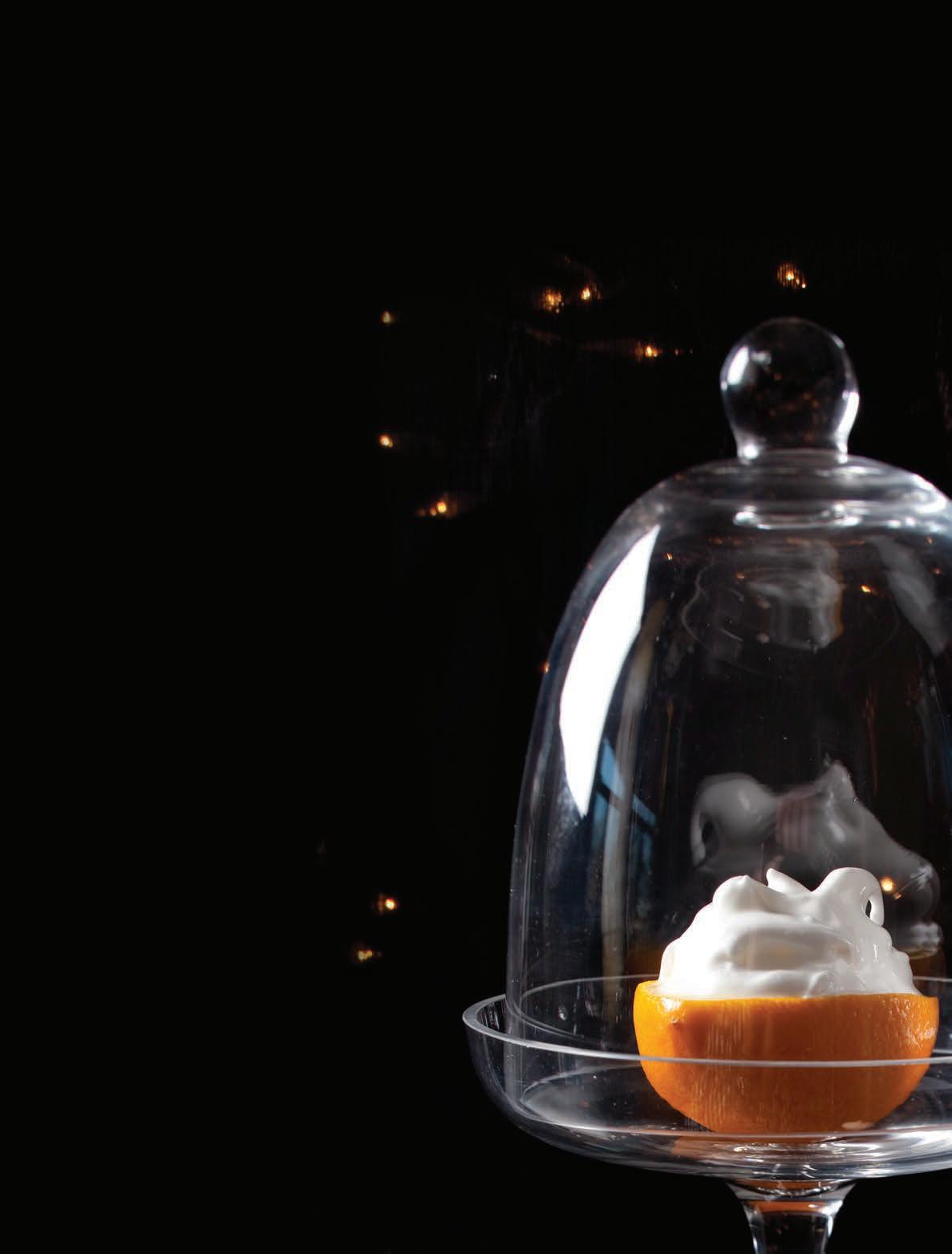
3 egg whites
2/3 cup sugar
Beat egg whites until foamy. Add about 2 tablespoons of the sugar and continue to beat until stiff peaks form. With machine on highest speed, slowly pour in the rest of the sugar until firm and shiny.
To assemble:
Fill prepared lemon or Meyer lemon halves (or small dessert cups, if using) with 2-3 spoons of chilled curd. Top with 2 heaping spoons of meringue. Sprinkle with toasted coconut
www.KosherSpirit.com 7
The Art of Kosher Certification
By Rabbi Yitzchak Hanoka
Food production is a complex industry with a vast range of production methods and equipment. Just as a doctor specializes in a specific area of medicine, yet is taught about the entire human body and how each part relates to his specific area of practice, Rabbinic Coordinators and mashgichim need a comprehensive understanding of the kashrus and mechanics of the specific production facilities they inspect, and a working knowledge of the general food production industry. This general knowledge helps the rabbis identify areas that require special
attention due to complexities or the sensitive nature of specific ingredients or production methods.
Every sector of the food industry has a set of unique behaviors and trends that are influenced by the many different aspects of the particular industry –commodity prices, competition, availability, market share, etc. Understanding the model enables the rabbi to assess the company. For example, if a company’s business model is to make the best popcorn, they will concentrate their efforts on producing only popcorn. Repackers, however, do not actually make anything. They receive bulk product from a production company and repackage it. This enables the repacker to offer a greater variety to the general market. The advantage of this setup from a kashrus perspective is that it is generally an all cold process; however, there may be an issue of compatibility in that some products look the same even though one may be pareve and the other dairy.
The art of supervision is to be able to understand the pertinent halachos and the production process in order to figure out a way to make it work when

F 8 www.OK.org
Part II:
problems arise without compromising the high standards of kashrus or quality.

It is vital for a mashgiach to have a thorough understanding of the industry he is supervising.
Every facility and every industry have their potential weak points and weak links that require an extra degree of scrutiny. It is for this reason that, per Rabbi Levy’s requirement, every facility has mashgiach instructions that are meant to address the particular nature of the facility. In addition to the written instructions for
the mashgichim, the ~ requires a detailed customized report that mashgichim fill out after every visit.
Every facility has sensitive areas that require special attention and the key is to be able to identify these areas and to set up the safeguards to protect them. The rabbi needs to identify an area needing improvement and then identify a solution. In the kashrus industry, we identify sensitive areas and create a plan to deal with them proactively, rather than waiting for an issue to occur. For example, companies that handle sensitive material that is difficult to obtain may be required to keep large quantities in stock so they will not run out and be tempted to seek an alternate supplier.
Another example would be vitamin and flavor companies. These types of companies handle raw materials that can be quite costly. One liter of material can be worth $10,000. These expensive ingredients are not stored together with other raw materials in the general warehouse, but are usually kept in a locked cage or in the office area. The rabbi has to be aware of these ingredients so that he knows where to find them and inspect them during his visits.
A private label company is another type of specialty company that requires special knowledge. A private labeler can be likened to an octopus – the production facility is the body and the many private label customers are the tentacles. A private labeler produces products and then labels the same product with many different brand names, with each brand being a client of the production company. A contractual agreement is required to link all of the brand names and labels to the specific factory.
Passover
Passover productions require a whole other level of special attention, in addition to the regular specialized knowledge required for different types of food production, including but not limited to the following examples. Only powder free gloves should be worn during Passover productions as the powder may cause a chometz or kitniyos concern. Processing aids, such as oils and lubricants used to move sticky product from one piece of equipment to another, require extra attention. Loaf pans are commonly sprayed with a release agent to help remove the product after baking. Release agents are even used on vessels that are only used to transfer product (like a truck). For example, when making almond paste for a Pesach production, large vessels on wheels (trucks) are used
www.KosherSpirit.com 9
The art of supervision is to be able to understand the pertinent halachos and the production process in order to figure out a way to make it work when problems arise without compromising the high standards of kashrus or quality.
to transfer the paste from the produc tion machine to the packing machine. These trucks are sprayed with lubri cant to help release the paste when it is transferred to the packing machine. Obviously, the release agent needs to be kosher for Passover, even though it is not part of the actual formula be cause the food comes in contact with the lubricant.
In large companies, where product is bulk manufactured through auto mated systems, it is important to en sure that all non-Pesach equipment is completely disconnected from Pesach equipment. This can be done in sev eral ways, including putting the nonPesach equipment in “off” or “locked” mode and sealing it with kosher tape, or by dismantling it so that it cannot be used.
The spice industry requires extra caution because price differential may cause some to adulterate the spices with cheaper additives, and it is extra important to have a mashgiach temidi during Pesach production due to the sensitive nature of Passover ingredients. For example, granulated garlic or garlic powder have almost the identical color as granulated soy or soy flour, thus granulated garlic needs a hechsher for Pesach because of the similarities and the temptation for adulteration due to the difference in price of the commodities. Mustard powder and ginger powder have the same color and can be easily switched or adulterated. Paprika powder can contain small amounts of vegetable oil to help bring out its natural color. Understanding the spice industry helps the mashgiach know what to look out for in terms of kashrus ramifications.
Rework
Rework, the reusing or reprocessing of production scraps (ex. leftover dough, trimmings that can be incorporated into a new batch), is common in the food industry. Minimizing waste is
What is Citric Acid?
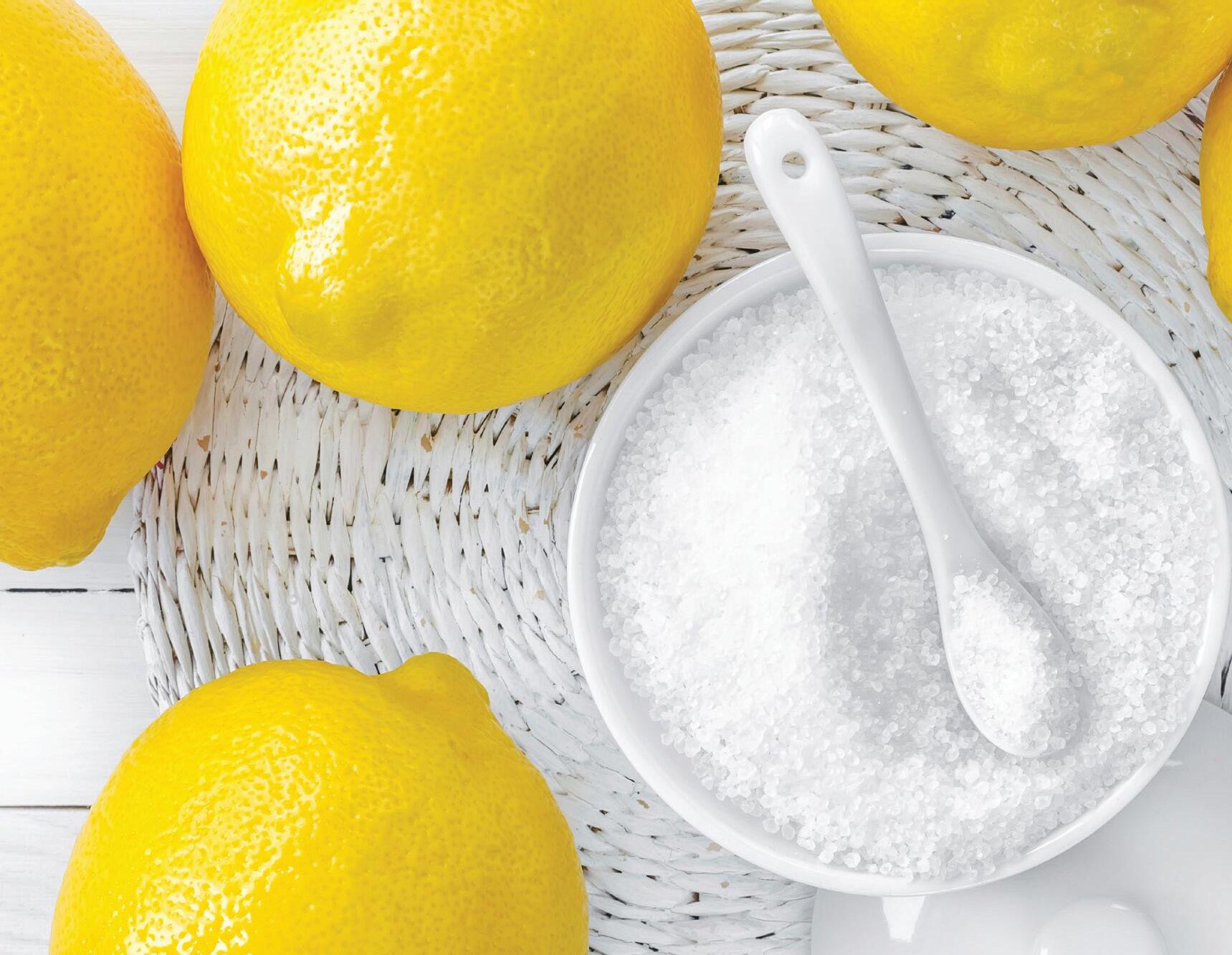 Rabbi Sholom Ber Hendel
Rabbi Sholom Ber Hendel
in an acidic environment. It is also used in dietary supplements because the body absorbs minerals better when they are attached to citric acid.
How is Citric Acid made?
Citric acid is found naturally in citrus fruits, but producing citric acid from citrus fruits is very expensive and the demand for citric acid is greater than the available supply of citrus fruits. Therefore, when you see citric acid on a product label, you can be sure that it is a powder that was made from the fermentation of sugars.
A culture of Aspergillus niger (a fungus commonly used in the pharmaceutical industry) is fed with sugar and metabolizes it into a liquid solution. The solution is mixed with lime (calcium hydroxide) which causes citrate salt to come out of the solution (precipitate). The citrate salt is then treated with sulfuric acid to make useable citric acid.
The sugars that are used for the citric acid can be derived from cane sugar, corn or wheat. In the United States, citric acid is most often derived from corn since it is a cheap, subsidized crop. In South America cane sugar is often used due to the low sugar prices, while in Europe wheat sweeteners are commonly used.
Is
Citric Acid Kosher?
Every fermentation process causes kosher concerns due to the ingredients that are used to make the fermentation more effective. ~ Kosher recommends using citric acid only with a reliable kosher certification.
Citric acid from cane sugar can be kosher for Passover, wheat based citric acid is chometz, and the corn based citric acid is considered kitniyos shenishtanah (changed to a different entity during the process).
The ~ does not rely on the leniency of kitniyos shenishtanah and you can be sure that the source of the citric acid is cane sugar when you see the ~-P symbol on a product containing citric acid.
10 www.OK.org
a
closer look
one of the ways in which companies remain competitive and control costs. A mashgiach must know about rework to help ensure that no dairy rework material gets into pareve products, or non-kosher rework into kosher products. Of course, if it is an all pareve or all dairy facility, this concern would not apply.

Safety
Training in kashrus control lends itself to critical thinking and a sharp eye that aids in areas outside of kosher supervision. If I see something unsafe during an inspection, I’ll speak up even if is not kashrus related because I was trained to notice and think about everything I see during the course of my inspection. Nothing is coincidental; from a spiritual perspective; kashrus and physical safety are intertwined in the dictum of “ushmartem meod es nafshoseichem” (guarding one’s health, both spiritual and physical).
Outreach – Personal Stories
Everything in the physical world has a source and a counterpart in the spiritual world. Kashrus is driven by the spiritual but has to be applied in the physical sense. We help bring out spiritual side of kashrus by helping be mekarev people and helping them connect to their neshamah
Years ago, the ~ gave a hechsher with a mashgiach temidi to a Jewish owned company that manufactured Jewish ethnic foods. The owner had an unfavorable experience in cheder as a child, and he shed his observance and ended up being a cantor in a Conservative temple. I reached out to him, not only on my annual visits, but I also went to his factory on Purim to read the megillah and part of the mashgiach instructions for this facility was for the mashgiach to put tefillin on the owner every day. The owner developed a warm connection
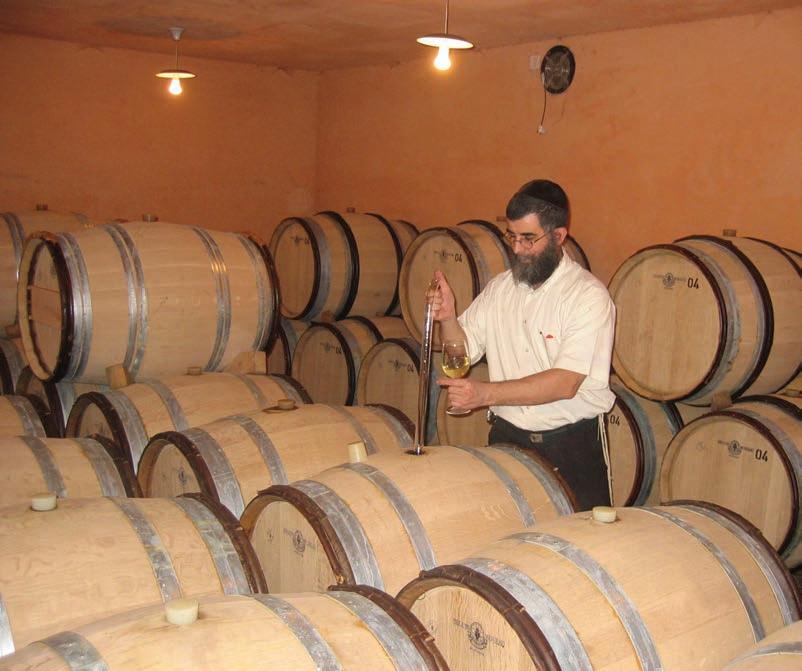
to Yiddishkeit and I put him in touch with a local Chabad shliach in his neighborhood to continue his growth. I have a picture in my office of the fellow sitting in his office with tallis and tefillin.
There was a story with another Jewish owner whom we asked to put on tefillin and he refused each time. After seven years of asking, the owner was finally ready. When I asked him what changed, he told me a story about how he was trying to get a whole new line of business and at the same time a relative of his in another state lost his job. He went to visit his relative to reassure him that all would work out for the best, and while he was there, he got the new business and actually needed a distributor in the state where his relative lives and was able to give his relative a job. He told me that he realized all of this was clearly orchestrated from Above and that G-d made this happen, so he was now ready to put on tefillin
In one of our large stores, an older woman once came to our mashgiach crying tears of joy because she never believed that she would be able to go shopping in a national store and buy kosher products. It was a very emotionally charged moment and a clear sign of hashgocha pratis.
There is an explanation from the Previous Lubavitcher Rebbe, Rabbi Yosef Y. Schneersohn, ztz”l, on the words “l’saper yetzias Mitzrayim”. Sipur means to relate the story, but it also means sefer – to learn about it and live it, and it can also mean sapir – to shine. The same can be said about kashrus – first we give the instructions and what the industry is all about, then our staff of mashgichim study and live it, and then they shine by fulfilling their shlichus. Kashrus achileh and shtiah (eating and drinking) – enables the body and soul to function harmoniously together because they can only shine when the body gets kosher food. The whole idea of Yetzias Mitzrayim is freedom from limitations. Kosher food frees us spiritually, especially with our high standards of kashrus, and this refines us and enables our neshamah to freely express itself through the body. In this way we become spiritually free and it enables us to live a healthy life spiritually and physically and fulfill the purpose of our soul’s descent into this earth and help to bring the Geulah
www.KosherSpirit.com 11
KOSHER CERTIFICATION
Rabbi Don Yoel Levy CEO/Kashrus Administrator
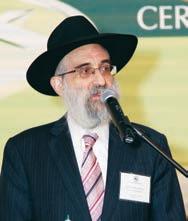
From the Desk of Rabbi Don Yoel Levy

Last summer, we received reports that Tropicana orange juice contained insects. We immediately checked containers of orange juice in our office and found nothing. Later, the original person who informed us that he found insects told us that he had used a filter that was not clean in order to filter the orange juice.
Nevertheless, at that time we also informed Tropicana and they did extensive checking in their sophisticated lab and also found nothing.
This winter the topic was resurrected by some people in Lakewood, NJ. Again, we took a very fine mesh cloth and filtered several containers of different varieties of Tropicana orange juice. The cloth was so tight that it took a very long time for the orange juice to filter through it. Upon examining the filter after the juice had been strained through, we once again found nothing – no insects or insect parts.
Following this procedure, I invited the person who claimed to find the insect or insect parts to our office to show us his methodology and see our methodology and he refused my invitation. We then bought more juice and had it filtered and inspected by renowned posek and Belzer Dayan, HaRav Usher Anshel Eckstein shlit”a. Rav Eckstein found a few small dots on the filter and we sent the samples to an independent
laboratory that confirmed the dots were not insects or parts of insects.
I then asked our posek the following question: “IF there are insect present in the juice, is there a halachic problem? HaRav Eckstein gave us a written psak that there is no halachic problem. Our other posek, HaRav M.M. Weissmandl shlit”a, concurred with HaRav Eckstein.
Finally, I received a video from the person who claimed to find insects. The video showed him straining and checking the orange juice, but his methodology was quite improper. He added water directly from his kitchen faucet to the juice and inspected the filter under a high magnification microscope. The one dot that he found measured 1/3 of a millimeter. Although the person who sent the video claimed that our tests were inaccurate because we probably used a cloth filter that was not thin enough, his video showed that the juice went through his filter much faster than it went through our filter.
Nevertheless, we asked Tropicana to investigate again and Tropicana did extensive checking using a very tight filter cloth and found no insects. Their tests concluded that any dots were fragments of orange peel or pit.
In conclusion, after receiving the video, and even after receiving reports (without any supporting evidence) the ~ repeated testing several times and found no evidence of insect parts. Renowned poskim from around the word, including HaRav Chaim Kanievesky shlit”a in Eretz Yisroel, HaRav Shlomo Zalman Ulman shlit”a of Eida HaChareidis,HaRav Dovid Feinstein shlit”a, and the Bais Horaah of Lakewood under HaRav Shlomo Miller shlit”a have all agreed with the psak of HaRav Eckstein that even if an insect was present, there is no halachic kashrus problem.
~ 12 www.OK.org
HQ: 391 Troy Ave. | Brooklyn, NY 11213 | t: 718-756-7500 | f: 718-756-7503 | www.ok.org
The ~ has a strong track record of taking action when suspected kashrus issues arise. When a potential issue is raised and halachic authorities conclude a change is necessary, the ~ implements the ruling right away. Some years ago, when the issue with strawberries arose, we invited Rav Eckstein to our office and he indeed showed us that the strawberries were infested. We immediately changed our policy regarding strawberries.
Some years before that, we certified a vegetable company producing leafy vegetables and felt that there was a problem. We invited Rabbi Vaih from Israel and he told us that they must drastically upgrade their equipment. The company refused and we dropped our certification on this company, which included several plants. (Another agency immediately assumed certification of this company even though 39 rabbis in the New York area objected in a public statement at the time concurring that the produce was infested and could not be certified kosher.)
What is most interesting about the supposed issue with Tropicana orange juice is that the ~, Tropicana and indepen dent laboratories and rabbonim have not found any insects. If there would have been a prob lem, the ~ would immediately act accordingly as we have done in the past.
-----Original Message-----
From: Rabbi M. M. Weissmandl [mailto:rabbi@nitra-k.org]
Sent: Monday, December 08, 2014 5:22 PM
To: Levy, Rabbi Don Yoel
Subject: RE: .יזופת ץימ רבדב הבושתpdf
ןייטשקע א"ר 'ופמה ג"הרה ידידי ד"וטטב כ"שמ יתיאר םיאורש תודוקנ ןינעב ןילקורבב אזלעב ק"ק ץ"מוד א"טילש ,תעלות תפילקמ םיקלח םהש םהמ שיו םיזופת ץימהב ןויעה ירחא םידדצ דועו רוסיאה רכנימ יוהמ אל ג"כהבד ,םלוכ אל םנמאו רעגרעבנייוו בייל המלש ר"רהומ ג"הרה בתכ ב"צויכ ,םיבוט ספדנ אוהו ראמטאס ק"ק צ"דב רבחו היאפ ק"קדבא א"טילש ץבוקב ספדנו הזב יתכראה יינעבו ט"ס ןוילג לארשי רוא ץבוקב ןויע ירחא החמומל קרו האורה ןיעל רכינ וניאש טרפב דעו תיב ריאמ םחנמ תודידיבו דובכב םינוכנ םירבד םהו ,תולכתסהו לדנאמסייוו -----Original Message
From: Levy, Rabbi Don Yoel [mailto:rdylevy@ ok.org]
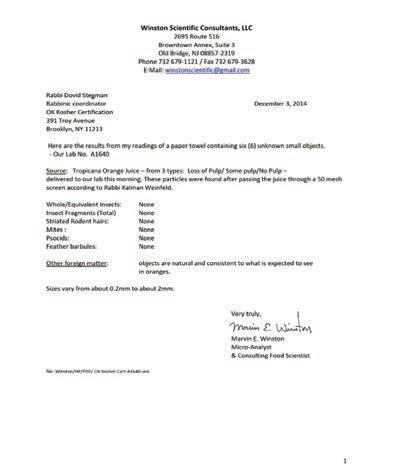
Sent: Monday, December 08, 2014 4:42 PM
To: Weissmandel, Menachem Meyer (rabbi@ nitra-k.org)
Subject: FW: םיזופת ץימ רבדב הבושת.pdf
ד”סב יוויל לאוי ןד ר”רהומכ תורשכה םלועב ויתולועפל ’פמה ברה ידידי כ”עמא א”טילש ר”האב ט”השדחא ,םיזופת ץימב םיעלות יקלח תאיצמ רבדב הנורחאל ררועתנש הלאשה רבדב רבדב ו”ח לושכא אלש רוזעי ת”ישהו השעמל הכלה הזב ד”נעלנש המ בתכא ’ירב לכואב ,ןיוואל שמחב ק”הותה הרסאש הזכ רומחרבדב טרפב הכלה
חכונ יתייה םגו ,יניעב יתיארש םירבדה תאיצמ הרצקב םידקאו .תיזכ וא
םיאצומ שופיחו ןוניס רחאלש ,תואמגוד וארהו ח”ת ואבש םינברה תפיסאב
אוה וז ץרש ןימ scale insect. ארקנה ץרשמ םיקלח ץימה ירמש ךותב
םירקוחה יבתכב ובתכנש יפכ ,ולש םייחה ךלהמ רדסב םיצרש ראשמ הנוש ,ירפה תפילק ךותב םהילגר םירדוח םינטק םדועבש םהירבד ןכותו ,ויתודוא
.םהילע ןגמל שמתשמו םהיבג לע שבייתמ הזש בע רמוח םפוגמ םיאיצומו םיקרפתמ םהילגר ןמזה ךשמב דועו scale ןתוא םיארוק הז ןגמ רובעו
.ןתומילשב םימעפ ראשנ ל”נה ןגמה םנמא ,שבייתנ טעמכש דע םילפונו scale ןגמה יקלח םיאצומ ץימה ביטיה ןוניס רחאש הלאשה ררועתנ התעמו .ומצע ץרשה יקלח םיאצומ רתוי שופיח רחא םימעפלו ,םירמשה ךותב ’ירב תוכייש םיקלח ולאל ןיא הארנה יפכד ,ארתהל םידדצ המכ שי הנהו וילע הרבע רבכש דועו ,םתונטק ללג לוטיבל םנידש ,םיקלחב קר רבודמו םינדו ,ט ’יעס ד”פ ןמיס ’ע ’ירב ששחב וליפא ינהמה pasteurized לושיב שי הזב םגו .ומצע ץרשה אלואמטה ןמ אצויכ וניד אוהש ןגמה לע רקיעב םיאצומ ביטיה שופיחו ןוניסה רחאש ,אוה םיררועמה תנעט םנמא ,דדצל המ תוכלהב וניצמ ז”כע אחריטב ךורכ וז ןוניסש םגהו ,ןגמהו ץרשה יקלח דפ ןמיס ראות ירפבו ,אנ ללכ שיר א”מכח ’ע] םיקסופה תונושלב םיעלות דירפהל רשפאש לכש [םיקסופ הברה ןושלמ ןכ חכומד ת”רדב ע”עו ,וט ק”ס רוסא ילואו ללכ לוטיבה ליחתמ אל הבורמ אחריטב וליפא רוסיאה ריכהלו ינהמ אל לושיב ןכו םיקלח וא ’ירב םה םא קוליח ןיא טושפ ז”פלו ,הרותה ןמ רחאל ד”נעל םנמא .וניעב דמוע וליאכ ונידו לטב וניא דירפהל רשפאש לכד לודג דצ הארנ הדבעמה רוריב י”ע השדח העידי ררבתנ םינורחאה םימיבש ושע ”יאק יואה“ לש תורשכה תכרעמבש םיחמומה .ראבאדכ יפושב ריתהל יבג לעמ וטקלו יעבימדכ ןוניסה םה ןכאש םירוריבהו תונומתה יפל םהל הארנש םיקלחה לכ ]mesh[ תננסמה לכ וחלשו ]brown[ םוח הארמ םהש םארמב םה םירכינו ,ןגמהו ץרשה יקלח הרורב הדבעמה תבושתו .םש תלעב עודי הדבעמל םיקדה םירוריפה ןתוא ,הטיחסה ידי לע וררפתנש ירפה יניערג יקלחמ םה םירוריפ ןתואמ ןבורש םידקנ רתיהה ראבנש םרטו .ללכ םיצרש םניאו המצע הפילקהמ םיקלח דועו ינשו .אתיירואד הלאשב הדבעמ לע ןיכמוס ךאיה השקת ’כל ,דחא הדוקנ ןיכמוס ייולגל אדיבעד רבדב ח”צ שיר ך”שה ירבדכ דחא ,רבדב תובושת ,בתכב םרוריב ובתכש םש תלעב הבושח הדבעמ לע טרפו יוג החמומ לע ןכלו תרחא ררבל א”אש טעמכ כ”עו ,רקש ובתכש ררבתי םא ומלכיו ושובי אקווד ך”שה ריתיה םש ג”מפה תערכה יפלד םגהו ,םתבושתב המה םיחוטב ןפואבד םש ראובמו ’ב ק”ס ופ ןמיס ז”טה ירבדל ןייצ ג”מפה םנמא ת”לסמב הדוקנ רשפאו ,דו .ןמיהמ יזא וניניב יוצמ הז רבדו ומש שוריפב רמא יוגהש ובתכש הממ קר אוה וז ץרש רבדב העידיה לכ ,וז הלאשל עגונה לכב הבושח
םיבתכב וארק קר ,ץרושה ץרשה ויניעב האר אל דחא ףא ,עדמ ילעב םייוגה לכ ונב הז לעו יניסמ הרותכ םהירבד ונימאהו ושעש ואידיווב וארו םהלש טרפב ,םיריתמ םייוג הפ לע ךומסל לכונ ורסאש םייוג הפ כ”א ,רוסיאה אל הרוחשה הדוקנה ד”ע ו ’עס א”מרה כ”שמ] .אמלעב אתלימ יוליג רבדב התעמ [ופוסב רבודמ ןאכו םוקירה תליחתב אוה א”מרה ירבדד ןאכ ךייש ןבור ןדגנ םנמא םיעלות יקלח תצקמ ולא ןירוריפב שיש ונל ררבתנש ןויכ הזיא דירפהל םילוכי ויה אלו וב ועט םיחמומה םגו ןיערגה וא יר ה יקלח םה שביד ט”ק ןמיסב טושפ יזא ,םיניערגהו תוריפה יקלח םה הזיאו םיצרשה םה םג תונטק תוכיתחבד ’ח ק”ס ך”ש ’יע ונימ וניאב וליפא ,בורב לטב שביב ולכואב שיגרהל א”אש דאמ תונטקב ו ק”ס ח”רפב ע”עו] לטב ונימ וניא ומכ םנידו יריפ הארממ םינוש םהש ולא םיקלחש אצמנ [לטבד הדומ ע”וכ רכינ םא אוה דירפהל רשפא תנעט לכו .םילטבו שביב שביכ םניד ןירוריפ ,ןיערגהו ירפה יקלח ,ולא םישוג הרואכל םגה טושפו ,הדרפהה רחא רוסיאה ,םישיש ץימה ףוריצב שיש טושפ ,םישיש ךירצו ,אוה ונימ וניאב ןימ ץרשהו ןהכ תחנמה תקולחמ איבהש ’ד ק”ס ד”פש טק ג”מפ ’עו איבהש ת”רדב ע”עו ,מ”אשמב שביה לטבל חלה ףרטצמ םע בקעי תחנמהו ןירימחמה ףא םנמא ,י”חנמהכ לקהל םיטונ ןבורו ,הזב םיקסופ לש המישר ןדיד ןודינב לבא ,םעט ןתיו לשביו חלה ןמ שביה דרפתי אמש םושמ םמעט אלו ץימה ןיתוש ןאכ הברדאו ,דחיב לכה התושו דירפמ וניא דחא ףאש התושו דוביאל וחלשוי ןירוריפה ודרפתי ןפוא הזיאב םאו ןירוריפה ןילכוא לכמ אצויה כ”ע ,םישיש רועישל שביה םע חלה ףרטצמש טושפ ,ץימה קר יקלח םהש םימודה ןירוריפ םג שי ץרשה ירוריפ דבלש ררבתנש ןויכ ונירבד לוטיב ןיד טושפ ונל שי יזא ולאמ ולא םירכינ םניאו ,המה םירתומו ירפה .קופקפ ילב ירשו לטבל םתנווכ ןיאב םייוג ידי לע השענה ןילקורב הפ ק”פל ה”עשת ולסכ ב”י םויה ונל
שיש העידיה יפל יתבתכ ז”כ תוכרב ימתוח לכב ןייטשקע לישנא רשא אזלעב תדה יקיזחמ להק ץ”ימוד www.KosherSpirit.com 13
THAILAND KEEPING KOSHER IN...
THAILAND;
A COUNTRY BURSTING
with exotic flavors, spectacular scenery, and jam packed with adventure. From forests and cities, to beaches and resorts, Thailand has everything to offer for the excited, adventurous tourist. But, how does one keep kosher in a country as remote and removed as Thailand? Well, beyond the unique traveling experience, Thailand is one of the premier locations for kosher travel worldwide. If there’s one thing that’s not lacking in Thailand, it’s kosher food.
Kosher life in Thailand is unlike any other. The cities boast a large variety of restaurants, grocery stores, and catering services. However, it wasn’t always like that. “It’s not even comparable to when we first moved here,” said Mushka Kaltmann, daughter of Thailand’s head Chabad shliach, Rabbi Yosef Kantor. “Our home used to be the bakery, restaurant, catering company, and Chabad House. We’ve definitely established a kosher presence here in the past twenty-two years.” Today, kosher food is in high supply. There are restaurants and grocery stores in several of the major cities, including Chiang Mai, Koh Samui, and
Phuket. Kaltmann, who recently got married in Thailand, had over six hundred guests at her wedding, which was catered by The Kosher Place, the local restaurant in Bangkok. Talk about a turnaround!
On average, the Shabbos tables across Thailand service over one thousand Israeli backpackers, tourists, and locals. “Many of these people would not be part of a Shabbos service otherwise,” one local related. “It’s incredible to see Israelis, who spent their whole lives enveloped in Judaism, finding themselves spiritually in Thailand. I guess anything is possible!” A shochet is brought in from Israel once a month to take care of the high demand for meat and poultry. Shluchim from several neighboring countries also receive their food supply from Thailand’s kosher sources.
Like many of the other events that take place in Thailand, Pesach is a sight to behold. Reservations and preparations for the seder begin months in advance. People travel to Thailand for Pesach from all over the world. Some of the sedarim mainly serve Israeli backpackers and tourists, while others are set up for local families. “For a couple of
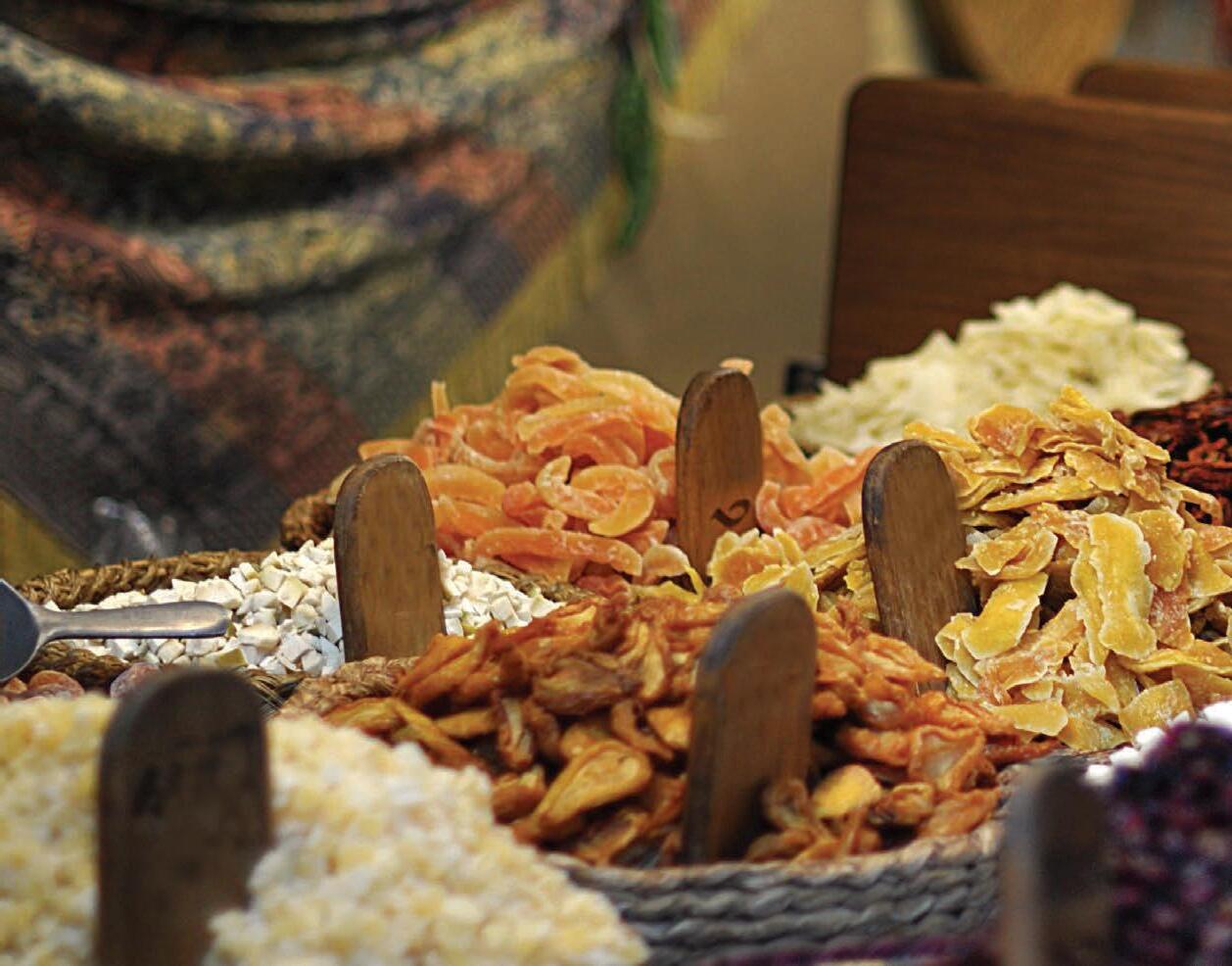
14 www.OK.org
THAILAND
years,” Mushka related, “Chabad of Ko Samui hosted Yom Tov on the beach because none of the venues were big enough.” Matzah and wine are shipped from Israel by the tons. Preparations for the seder take place at The Kosher Place. These days, many of the Chabad Houses are better equipped, with halls that can seat up to seven hundred people at a time.
Jewish tourists travel through Thailand year round. One Israeli couple that has been traveling to Thailand for business for over ten years, related their unique and enjoyable experiences in the beautiful country. “The only thing I bring with me from Israel is a specific brand of coffee for my husband,” she boasts. “We go every six months or so, for a month at a time.” For the couple, a professor, and her husband who works in the jewelry trade, Thailand has everything to offer. While she travels around the country, lecturing and teaching, her husband visits various jewelry stores and trade shows, which come through the country several times a year. “I always say that the month we spend in Thailand rejuvenates us for the rest of the year.
BY LEIGH HERSHKOVICH
It is one of the easiest places to keep kosher.” With just a rice cooker and a steamer, they turn their temporary living space into a five star restaurant. With the wide availability of exotic fruits and vegetables, one will never go hungry. “You can say shehechiyanu almost every day! I’ve never walked through the marketplace without finding a fruit that I had never seen before.”
While some tourists make their home in one city during their visit, many others are constantly on the go. “We never sleep in the same city for more than a day at a time,” one tourist shared. “There are kosher resources available in almost every city, but just in case, we always pack extra food with us before we leave Bangkok.” Many of the restaurants will also deliver or ship food to different locations around the country, where food may be harder to come by. “I’ve traveled through most of Asia, and Thailand is undoubtedly the easiest place in Asia to keep kosher,” another tourist shared. With a statement like that, it leaves one wondering: Why not pick Thailand as your next travel destination?

www.KosherSpirit.com 15
HEALTHY KOSHER TRAVEL TIPS
By Rabbi Elisha Rubin
16 www.OK.org
In order to do the top notch kashrus work that we do here at the ~, we make sure to personally visit our facilities on a regular basis, even when located in far flung parts of the world. I feel very strongly that this personal involvement is what makes the ~ such a premiere, top of the line hechsher. Alas, extended trips to the other side of the world come with lots of challenges to a person’s physical, spiritual and family health. Just as a simple example, in the first 6 years that I worked for the ~, I gained over 30 pounds, to a large extent attributable to the challenges of eating healthy when travelling (B”H, using the tips I learned below, I have lost 50 pounds since).
CHALLENGES
Travelling is inherently very tiring. Time zone changes further disrupt the body patterns making it harder to concentrate on learning and productive activities and/or relax. The out of whack feeling drives a craving for comfort and junk.
By being physically separated from family and community, there is a mental detachment that makes one feel less connected to one’s regular life and family. For example, shortly after starting working for the ~ I moved into a new house. Because of market conditions, I am renting out (rather than selling) my old house. At some point, I got a phone call when I was out of town about my rental house. When I came back I realized how out of touch and unrealistic my answers were because of how [mentally] removed I was.
When traveling, one seems to be bombarded by inappropriate images. Whether from other travelers, or advertisements, it is a challenge to avoid such an environment.
At the end of a hard day of work one typically arrives at a hotel tired, exhausted and stressed (driving on the Autobahn at 224 km/h might be fun the first time, but it is also very tiring). There is a need to relax and unwind. In the 4 walls of a small hotel room there is not much relaxation easily accessible
other than the obviously problematic TV, Internet, etc.
Boruch Hashem, the ~ has much experience with travelling and along with making sure that the food we are certifying is fit and kosher, we make sure that our employees are kosher and fit. The following are some tips from our experience that can apply to all travelers.
TAKE CARE OF YOURSELF
Set reasonable goals and expectations. Don’t expect to work a full day, travel a few hours to the next day’s work location, and, when you finally get to your hotel, answer emails and workflows (not to mention daven, learn and eat) and then still be a functioning human being. You need to know your limitations. Make sure to plan enough time to take breaks and get enough sleep. Keep up an exercise routine.
1. 5BX is an excellent exercise program. It takes 11 minutes per day and requires no equipment to do. Download a PDF at www.bit.ly/1F3fLLQ
2. If you explain that it is for religious reasons, you may be able to arrange for the hotel to allow you access to their exercise equipment when it is closed to the
public, especially if you have preferred status.
Drink lots of water. It is essential to maintain healthy functioning. (Get aisle seats on your flights if you need.)
When you are on a longer trip with lots of travelling around, you don’t need to shlep your entire luggage with you. You can carry around a few days’ worth of items in a carry on and ship your larger suitcase ahead of you. At least in Japan, this is very inexpensive. Airport lounges, when access is possible, are frequently an oasis of serenity. You can find a quiet cubicle to daven, learn and work, undisturbed by the outside world.
Many hotels will remove or disable the TV upon request. It doesn’t hurt to ask.
Bring along something healthy to relax with when you get to your hotel. Personally, I like to take a book of light short stories, but it could be anything that you find relaxing.
STAY IN TOUCH
Stay near a frum community and daven tefilla b’tzibbur when possible. www.godaven.com and www.chabad. org are excellent resources to help you locate minyanim and frum communities wherever you go. The websites of local shuls found on these sites will usually help you locate local kosher food options.
Try hard to keep up regular learning programs.
Stay in touch with family. Call home to do homework with the kids and hear about your wife’s day. There are numerous free internet calling options. I personally prefer Google Voice. If you have an unlimited data plan on your phone you can have unlimited worldwide calling on your phone for no cost, using the Google Hangouts app. This is even available on phones that are totally “kosher” with no Internet access.
www.KosherSpirit.com 17
Useful Travel Apps:
Note: The Internet and other harmful material can be much more easily filtered/restricted on an iPhone than an Android, so the iPhone is the smartphone of choice for the kosher traveler. Your local Technology Awareness Group office (www.taghelpline.org) and others can easily take care of the filtering.
• Kosher GPS
• ךרדב ךתכלבו
• Kol Halashon
• Daf Yomi
• ~ Kosher Food Guide
• mMinyan
• iZman
• Hadaf Hayomi (Hebrew Letters)
• Jewish Days
• Compass (built into iPhone)
• Daily Tanya
• Chumash
• Rambam Daily Study
With Siyata D’Shmaya we should all be blessed to make kosher travel choices, both physically and spiritually, and bring the light of Torah and mitzvos with us, wherever we go.
CREATE A MISSION STATEMENT FOR YOURSELF
1. I am on this trip because the Ribbono Shel Olam has sent me here and here is where I have my job in life.
2. I will represent the Ribbono Shel Olam with everything that I do on this trip.
3. I am here to benefit my family and Klal Yisroel spiritually and physically. When no one is available to talk to because of the time zone difference, write letters/emails to your family.
Try to have a spiritually safe friend that you can be in touch with, especially if you will be in a particularly challenging situation.
FOOD
Prepare meal plans in advance:
• Crisp Snax are excellent starch (24 = two slices of bread).
• Nuts are a great option, but you need to count them to not overeat. (25 pistachios, 17 almonds or 10 cashews = 100 calories)
• Flat pack tuna is very convenient to carry around, eat on the run and get though airport security.
• Some people find Cheerios packed in Ziploc sandwich bags to be a good on the run breakfast option.
• Beef jerky is an excellent shelf stable high protein meal core (though it is high in sodium so those sensitive to sodium will need to avoid it).
• It is frequently worth staying a hotel where you have preferred status, just so that you can get fruit/vegetables from their lounge or breakfast.
• Vacuum packet meals (e.g. grilled chicken or pastrami), available at some local stores can last a long time, especially when refrigerated overnight (freeze before you leave).
• Cholov Yisroel milk powder may be available in the baking section of your local kosher supermarket (Baker’s Choice currently makes it).
• Arrange meals or food pickup with local Chabad house or Jewish community (see above on how to locate them).
• Most (if not all) Asian hotel rooms have hot water kettles. You can even kasher the kettle if you want to by filling with water, boiling and emptying and rinsing (ask your personal rabbi for guidance here). Then you can make oatmeal from instant oatmeal packets for breakfast. You might even be able to boil eggs in one. (I have heard reports of others doing this successfully. I’ve never tried it myself.)
• Dagim has some healthy shelf stable fish meals (heatable in a microwave or on a hot plate).
• Airport lounges can frequently be a good source for fruit (or even vegetables).
18 www.OK.org
Hashgacha Protis
By Rabbi Levi Klein, Mepmhis, TN
I am a supervising mashgiach in a facility belonging to one of the ~‘s largest companies. This plant requires frequent visits to kasher from dairy to pareve. The entire production schedule of this facility is largely based around my availability to kasher.
Shortly before last Pesach, as part of my Chabad House shlichus, I was taking a community trip to Eretz Yisroel. I had to push off scheduling a visit to the facility, but it was going to require koshering, so I scheduled a trip to Humboldt, TN (about an hour from Memphis) for the Sunday before Pesach.
Of course, I had a lot going on at home and at my Chabad House since it was only a day or two before Pesach, but I needed to visit this facility. I was running late, but when I jumped into my car I noticed I did not have any boxes of shmurah matzah with me (I just had my car cleaned for Pesach). “I’m a Chabad rabbi. How could I
leave Memphis without boxes of shmurah matzah?” Even though Humboldt was a small town, probably devoid of Jews, I just couldn’t travel there Erev Pesach without shmurah matzah, so I ran back to my office to get a few boxes.
As I pulled off the highway in Jackson, TN, about 20 minutes from my destination, while on a phone call, a second call went into my voicemail. I checked the message and, lo and behold, it was a man in Jackson asking for matzah. I called him back and told him that I was actually in Jackson right now with matzah in my car! Within three minutes I was standing at this man’s front door with a box of shmurah matzah in hand. He mentioned that he had called two other places, and realizing it was Sunday, did not even know what prompted him to bother leaving a message on my voicemail. I told him something deep was obviously going on between him and Hashem and I was just the messenger– true hashgocha pratis.
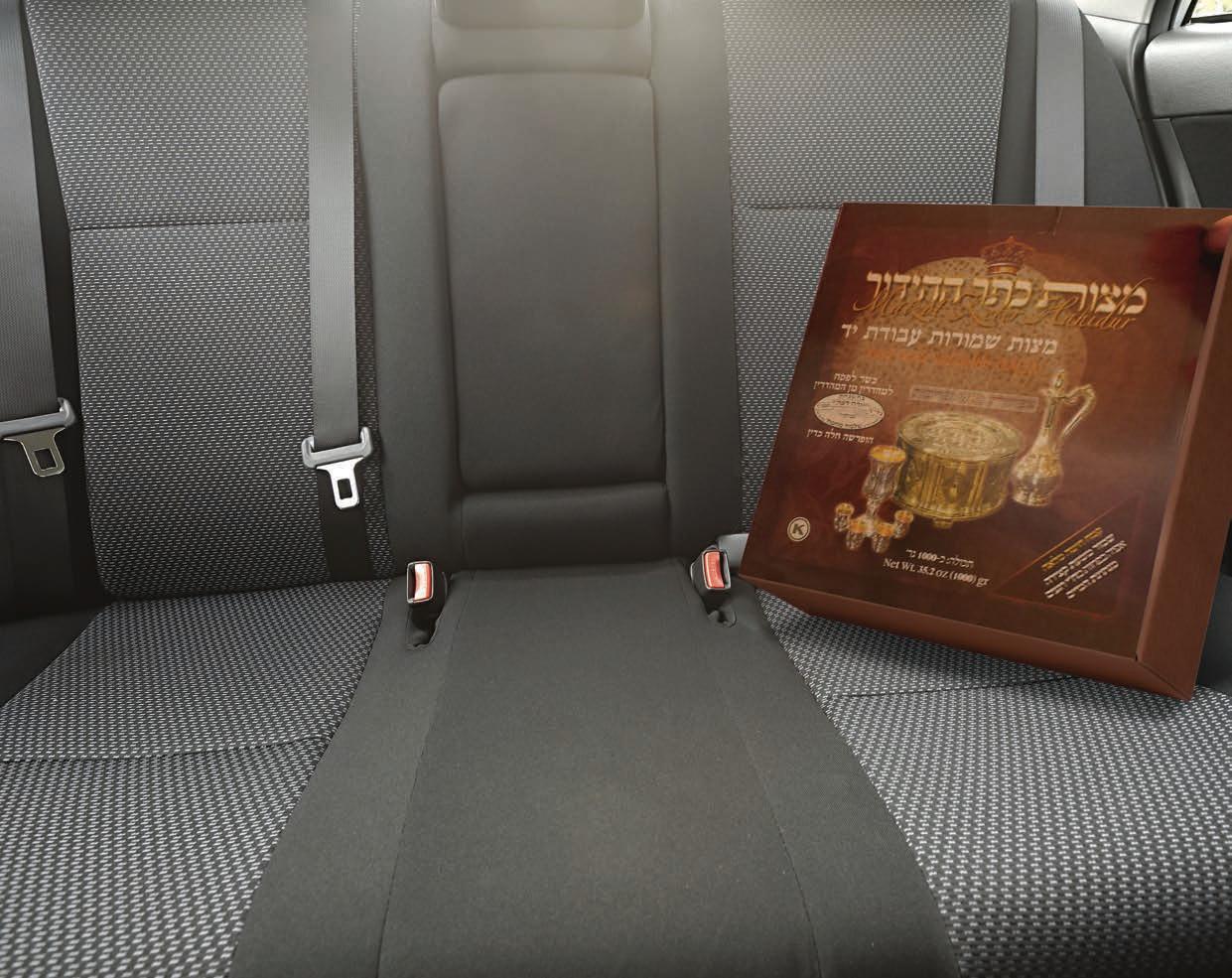
www.KosherSpirit.com 19
WHO’S BEHIND THE ~
MEET OUR STAFF: BEHIND
KS: Where did you grow up? Where did you go to yeshiva?
RKW: I grew up in Jerusalem and learned in Talmud Torah HaMesorah under Rabbi Krashinsky and then in Yeshivas Toras Emes Chabad. After completing yeshiva, I moved to Crown Heights where I studied for three years for semicha at Lubavitch Headquarters.
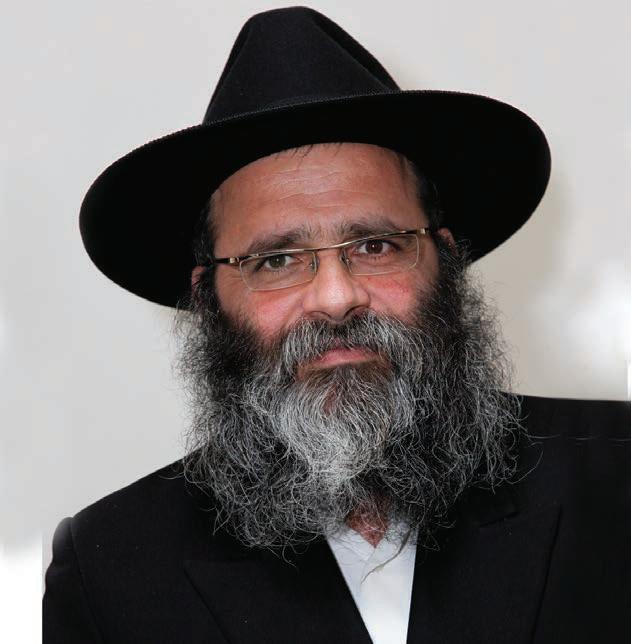
KS: What did you do after yeshiva?
RKW: After receiving semicha, I did a combination of shlichus and IDF service for four years. For the first year, I served in a meteorologist base and for the next three years I was in charge of kashrus at an air force base serving over 2,000 soldiers, three times per day.
KS: What is your current position at the ~?
RKW: My current position is Food Service Rabbinic Coordinator. I oversee the kashrus of all ~ certified restaurants and catering establishments.
KS: What prepared you the most for your current position at the ~?
RKW: My kashrus work in the IDF, years of training by the ~, and my parents’ teachings about the essential importance of the kashrus of the food that keeps us alive, combined to prepare me for my current position.
KS: What is best thing about working at the ~?
RKW: My favorite thing about working at the ~ is the aspect of shlichus. I work in the field and constantly meet people who I have the opportunity to influence in Torah and mitzvos.
KS: How would you describe the ~ today?
RKW: I would describe the ~ as being both very big and very small at the same time. The ~ has seen tremendous growth and is involved in kashrus worldwide. At the same time, the ~ is run as if it was a smaller agency with a family atmosphere because Rabbi Levy makes sure to be involved with every employee and every company certified by the ~.
KS: Can you share an interesting experience that you had while working at the ~?
RKW: A few weeks ago I finished visiting restaurants in Manhattan. I usually travel by train and on the way to the train station I saw a person sitting on the street near a non-kosher restaurant with a sign saying, “Please help me. I am homeless.”
I gave him a quarter and noticed that he looked young so I asked him, “You look young, why are you on the street?” He told me that his wife passed away from pregnancy complications and he got so depressed that he did
~
Interview with Rabbi Kalman Weinfeld
Rabbi Kalman Weinfeld
20 www.OK.org
not go to work and got fired and subsequently lost his home. He had been living on the street for the past eleven months and all of his possessions were in a storage locker in New Jersey. I asked him why he did not look for a job and he replied that nobody wanted to hire a homeless person. His mother only had a one bedroom apartment and did not have anywhere for him to stay. A woman listening to the story went into the coffee shop and bought him a $50 gift card so he could buy food. I continued to talk to him and try to encourage him to look for a job.
Then, a young man tapped me on the shoulder and spoke in Hebrew asking if he could talk to me. He told me that he had been listening to the conversation for the past fifteen minutes and asked me if I was sure the homeless man was not Jewish. I replied that I was sure. The young man then told me that he was from a Chareidi family and went off the derech two years ago. His parents never threw him out, but his community ostracized him. The father of one of his friends sat shiva for his son and six months later the father passed away. The friend did not want to sit shiva but the young man convinced him saying that his father sat shiva for him, so he should sit for his father.
This young man was on his way into the non-kosher restaurant when he saw me, a frum man with a beard, talking to the homeless non-Jew. The young man could not believe that I would spend so much time with the homeless man. Then and there he decided not to go to the non-kosher restaurant and asked me to direct him to a kosher restaurant. I went with him and sat down to eat with him. I spoke to the restaurant owner and the owner offered the young man a job, which I told him was a sign that Hashem wants him back and that he should continue eating kosher food. This is the way I was taught by my parents and grandmother, Omama, and I am proud to continue in their path.
“
What Other People Say
Rabbi Kalman Weinfeld
“ The ~ restaurants are known for adhering to the highest standard of kashrus . We require a mashgiach temidi and are very particular about the products we bring in. Leafy vegetables and all produce are carefully checked. In order to enforce these standards we need a special person. Just being strict and a stickler for details is not enough. We need a yorei shamayim who is meurav bein habrios.
Rabbi Kalman Weinfeld combines these two traits together with his vast knowledge and experience to make him one of the recognized and foremost experts in food service kashrus today.
After the recent AKO Vaad (Association of Kashrus Organizations) meeting, where Rabbi Weinfeld gave a lecture, I heard only compliments from the heads of of the largest certifying agencies about Rabbi Weinfeld.”
Rabbi Don
Yoel Levy
Kashrus Administrator
“ I learned from my mentors that a good mashgiach is someone who can be described as: םיכרחה ןמ ץיצמ תונולחה ןמ חיגשמ– “he watches through the windows AND peers through the cracks” (Shlomo HaMelech, Shir HaShirim 2:9). Rabbi Kalman Weinfeld exemplifies both of these attributes. He is a wellrecognized kashrus expert in the area of Food Service who retains the highest levels of kashrus possible. Nonetheless, his kashrus expertise is packaged within a warm personality and exceptional common sense (the fifth section of the Shulchan Oruch), making him an absolutely successful Food Service Rabbinic Coordinator respected by kashrus professionals, his staff and clients.”
Rabbi Eli Lando
“ A professional in kashrus is one who knows the goal; but more than that, one who knows the correct way to achieve that goal, with respect and dignity. To get from A to B one can drive on the road, or, one can also drive on the sidewalk, but will then inevitably knock down pedestrians.
Rabbi Kalman Weinfield has learned (and teaches) the correct way to navigate and reach the desired standards of kashrus.”
HaRav Usher Anshel Eckstein shlit”a Belzer
Dayan
“
www.KosherSpirit.com 21
The young man could not believe that I would spend so much time with the homeless man.
The Middle Matzah
Compiled by Dina Fraenkel
The fourth step of the Pesach seder is “Yachatz”, breaking the middle matzah. When we break the matzah, each piece gets its own, opposing identity. The smaller piece is the “poor man’s bread”, while the larger becomes the Afikoman, a symbol of the Paschal lamb. The smaller, humble piece, over which we recount our slavery and exile, remains on the table under the seder plate, while the Afikoman, the symbol of redemption, is hidden out of sight.
A glaring question arises. How can one simple matzah embody two dynamic, fundamentally opposite “personalities”? The fifth Lubavitcher Rebbe, Rabbi Sholom DovBer (the RaSHaB), answers this question with a story of the Ba’al Shem Tov:
Yisroel Ba’al Shem Tov, the founder of Chassidism, sometimes signed his name as “Yisroel from Okop”. Okop is not the name of the town where the Ba’al Shem Tov lived. He actually was born in the town of Tlost, rather Okop means “trench” in Polish.
Tlost was originally a walled town, but at some point in history the walls were de-
stroyed, leaving numerous trenches. The Ba’al Shem Tov’s parents were so poor that they could not even afford the most basic home and lived in the trenches. The Ba’al Shem Tov was born in one of these trenches, and hence signed his name “Yisroel from Okop”.
In the sefer Kesser Shem Tov , the Ba’al Shem Tov states that while he is not actually Moshiach, his Chassidic movement will ultimately be responsible for bringing Moshiach. So, after telling this story, the Rebbe RaSHaB would add, “From the Ba’al Shem Tov’s trenches we have been granted the strength to get out of all other trenches, for the Ba’al Shem Tov’s influence is unfaltering.”
The irony here is enormous. The Ba’al Shem Tov, who is responsible for influencing the Jewish world and eventually bringing in the Era of Redemption through his teachings, started his life in a trench! This irony and disparity is the whole point. As Dovid HaMelech wrote in Tehillim (118:5): “Out of the straits I called upon G-d; G-d answered me with expansiveness.” The expanse can only come after we have been squeezed through the smallest space.
This is the essence of the middle matzah. Slavery and redemption, poverty and wealth, both come from the same piece of matzah. Light follows darkness, hope follows despair, triumph follows tragedy.
Even though our current reality is full of darkness and concealment, even though we cannot see the solution to the problems in our world, Moshiach is waiting right around the corner, the other half of the matzah, and we will soon be pulled from our trenches of Golus and into the final Geula by our righteous Moshiach.
(Adapted from a sicha of the Lubavitcher Rebbe from the 2nd night of Pesach 5720.)

CHASSIDIC INSIGHTS
Ma’os Chittim

There is a long standing custom to give to the less fortunate before Pesach to help them with their Yom Tov expenses. We can see a hint to this in the Torah. Regarding Pesach, the Torah says: “Chag hamatzos”, but the word matzos is spelled without a vov )תצמה גח(.
תצמ is an acronym for “ tzedakah tazil me’maves ” (charity saves one from death) and it is the tzaddik in the middle, representing tzedakah , that separates the mem and sof , which spells mais (the body of one who has passed away).
ONCE, REB NAFTOLI OF ROPSHITZ spoke to his community on Shabbos HaGadol. He said according to the Rambam on the Laws of Pesach, each and every Jew needs to eat matzah and drink four cups of wine on the night of the Seder, even if the person is very poor. In the laws of stealing, the Rambam writes that a person must not steal, even less than a perutah (like a penny).
So Reb Naftoli of Ropshitz asked, “How can these two laws co-exist?” He answered that the rich could solve this contradiction by giving ma’os chittim to the poor.
When he got home, his wife asked him, “So, how did your Shabbos HaGadol speech go? Did the community take to what you were saying?” Reb Naftoli answered, “Half of them did…the poor are willing to accept.”
SOUL NUTRITION


Download the Kosher Food Guide app and get the most updated list of the Kosher for Passover products that ~ Kosher certifies. It’s like having a rabbi at your side whenever you go shopping... Is it Kosher for Pesach? KOSHER CERTIFICATION ~ Kosher Spirit, 391 Troy Avenue • Brooklyn, NY 11213 718-756-7500 • info@ok.org • www.ok.org follow us on Twitter @KosherAlerts For the latest in Kosher news: follow us on Facebook facebook.com/okkosher 2 cutting-edge Kosher Apps now available as a free download on Google Play or the App Store
wishes for a Kosher and Freilichen Pesach from ~ Kosher Certification
Best

















 Rabbi Sholom Ber Hendel
Rabbi Sholom Ber Hendel











